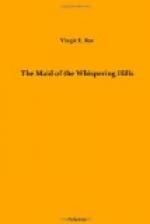So they sat a while, these two from the ends of the earth, and the warm Irish heart cleared itself of tears, like April weather, to come up laughing in another moment.
“An’ to think ye niver told us your name, asthore!” she said, wiping her eyes; “nor yer home place! Were ye raised in this post av haythins?”
“Maren Le Moyne of Grand Portage. My father—was a smith.”
“Of Grand Portage! An’ ye are so far inland! I am Sheila O’Halloran, av all Oirland, an’ wife to Terence th’ same,—yer fri’nd for always, asthore, f’r niver will I be forgettin’ this time!”
She turned to the fair woman, smiling and alight.
“Did ye iver dhrame av such romance, my dear?” she asked. “An’ isn’t it just wonderful to find a real live heroine in th’ wilderness?”
The woman was toying with a bunch of grass, winding the slim green blades around her pale fingers, and she looked back with peculiar straightness.
“It is all very wonderful, Sheila, and commands admiration, of course; but, for my part, a strange woman alone on the rivers with a party of men must have something beside her own word to vouch for her before I should take her in with open arms. You are too ready to believe anything. How do you know this venturess is not a—Jezebel?”
For a moment an awful silence fell upon the three, and they could hear the myriad sounds of the evening camp round about.
Then Maren, her eyes wide in amaze, said stupidly:
“Eh,—Madame?”
And the Irishwoman cried: “Frances! For shame!”
But the other was very much composed.
“I am right, all the same,—what woman of modesty would follow a man to the wilderness, confessing brazenly her love? You haven’t noticed any hysterics on my part over it,—nor will you. I think it all a very open scandal.”
The little woman was flying into a rage of tumbled words and hopeless brogue, but Maren Le Moyne, the blood red to her temples, rose silently, took the pot of broth, and walked away, and never in her life did she hold herself so tall and straight.
As she knelt beside the blanket bed of McElroy, and lifted his helpless head, her eyes were burning sombrely.
“This, too?” she was saying dumbly, within herself. “Is this, too, part of the lesson of life?”
And all through the days that followed, long warm days, with the songs of birds from the gliding shores, the ripple of waters beneath the prow of a canoe, she sat beside the unconscious man and looked at him with dumb yearning.
For love of him,—what would she not have done, what would she not do still for love of him,—he who had sold her for a kiss; and for it there came something,—she could not define it,—something that seemed to live in the atmosphere, to taint the glory of the sunshine, to speak under every word and whisper.
Never again did she cook at the fire with the others, but had her own on the outskirts, and Sheila O’Halloran came and cooked with her, talked and comforted and hovered about Anders McElroy where he lay in a silence like death, his fair face flushed with fever and his strong hands plucking at everything within their reach.




